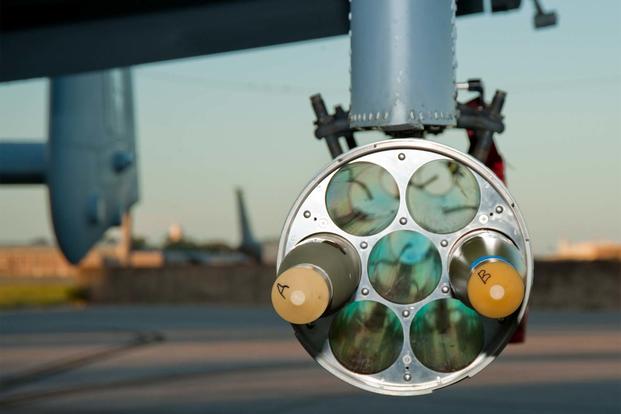Elements of the U.S. military supporting Iraqi forces in Mosul are counting on a newly fielded, precision rocket to help destroy enemy targets without causing civilian casualties in the upcoming battle for the western part of the city.
After more than three months of heavy fighting, Iraqi Security Forces have liberated the eastern portion of Mosul after killing a "tremendous" number of Islamic State of Iraq and Syria fighters, Air Force Col. John Dorrian, spokesman for Combined Joint Task Force-Operation Inherent Resolve, told reporters Wednesday at a Pentagon briefing.
Iraqi forces are poised to launch an assault on the western half of the city, which is more densely populated than eastern Mosul, Dorrian said.
"The terrain in west Mosul makes it a challenge to clear," he said. "On the ground, the narrowness of the roads and the density of the buildings set conditions for close fighting."
Coalition leaders, however, are confident they can continue to use airstrikes to support Iraqi ground forces "without causing drastically increased civilian casualties or collateral damage," Dorrian said.
"Protection of civilian populace is a cornerstone of the Iraqi campaign plan, and our efforts will be consistent with that priority," he said.
One advantage the coalition has is the Advanced Precision Kill Weapon System II, Dorrian said.
"This is a laser-guided, high-precision, low-collateral damage weapon that provides the capability to engage targets, including moving targets in dense urban terrain," he said.
These precision weapons were "fielded last year, within six months of congressional approval and are now being used for close-air support missions by Air Force A-10s and Marine AV-8B Harriers," Dorrian said.
Since June 2016, more than 200 of these munitions have been employed against enemy fighters on targets such as oil tanks and vehicle-borne improvised explosive devices, he said. More than 60 have been used in and around Mosul.
Dorrian would not say when the operation to liberate western Mosul will begin. Coalition forces are helping Iraqi forces with planning; advice; airstrikes; and intelligence, surveillance and reconnaissance support.
Airstrikes have killed 18 ISIS leaders since last October, forcing the extremist organization to replace these key commanders with less-experienced leaders, Dorrian said.
Reports indicate that ISIS forces are displaying desperate behavior as they struggle to hold onto Mosul.
"Its leaders are accusing citizens of spying and, tragically, they are executing people who don't cooperate with them in some cases," Dorrian said. "They have also lost trust in some of their fighters, and they have even done executions against their own fighters."
After the recent capture of Mosul University, Dorrian said Iraqi forces discovered a chemical weapon production facility ISIS had been using to make mustard agent, a chemical weapon that creates large blisters on the skin and lungs.
"We have long known that the enemy has aspired to use chemical weapons," he said. "Mustard agent is one that they have used many times, and the reports that we have are that is what was found in Mosul."
While considered rudimentary capabilities, ISIS "does have very capable production facilities, so it is very important that we continue to roll back their control of territory because this is not something that we want to wait and let [ISIS] get good at."
Once Mosul has been liberated, it is likely that Iraqi forces will turn their sights on other pockets of ISIS-held territory in the country but, for now, "It's all west Mosul, all the time," Dorrian said.
-- Matthew Cox can be reached at matthew.cox@military.com.






























